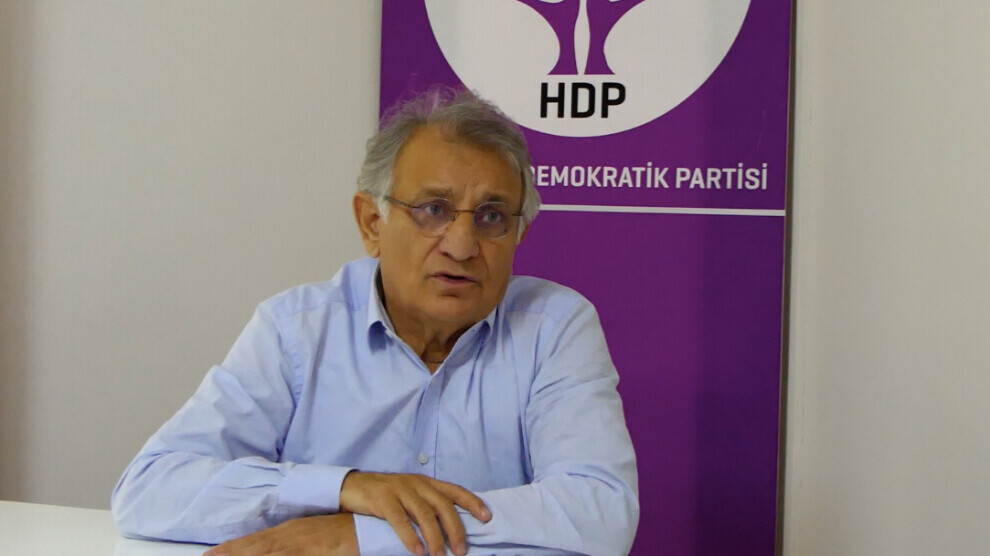HDP MP: A quarter of Turkey’s budget goes to war
The Turkish state has spent a quarter of its budget on military expenditures in 2021. HDP deputy Erol Katırcıoğlu says next year's budget will also be primarily a war budget.
The Turkish state has spent a quarter of its budget on military expenditures in 2021. HDP deputy Erol Katırcıoğlu says next year's budget will also be primarily a war budget.

A quarter of the Turkish state's 2021 budget went to war. Peoples' Democratic Party (HDP) deputy Erol Katırcıoğlu said the 2022 budget will be similar and vowed strong HDP opposition for a public budget in the interest of the people.
Erol Katırcıoğlu is a member of the Parliamentary Budget Commission and spoke to ANF about the upcoming start of the 2022 budget debate on October 26. In this context, he also addressed the rapid devaluation of the Turkish lira (TL).
Katırcıoğlu noted that the figures for 2022 have not yet been determined, saying, "We will face a bigger budget in 2022 than in 2021. At that time, spending reached one trillion and TL 400 billion. The budget reflects the government's preferences in favor of which segments to use tax revenues."
A quarter of the budget for the war
HDP politicians have been traveling around Turkey and Northern Kurdistan in recent months, holding popular meetings to determine the need for a budget in the interests of the people. Katırcıoğlu stated, "In the post-2015 period, security spending took a larger share in all budgets. I do not mean only military spending, it is also about spending on police, gendarmerie (military police) and coast guard. Last year, this reached almost a quarter of the budget. The money that was allocated for security activities is ultimately money that could have been used in the public interest. Since this is obviously not in the government's interest, I believe that the budget for 2022 will be similar to last year. The general economic approach of the government has not changed. There is talk of S400 missiles again and consideration is being given to buying F-16 fighter jets. The state again sees itself as part of the arms race. Economic prosperity is not achieved because Turkey cannot use its resources wisely. As HDP, our priority is the people. We are not thinking about security spending, but spending that will relieve the burden on society and allow it to focus on more peaceful activities. The budget goes to the Budget Commission first and foremost. There are three of us from the HDP in the commission and we will form a strong opposition, as we have done in recent years. We have already started to conduct a kind of preliminary study at the people's meetings on the budget. We are meeting with different parts of society to understand what they want from the budget."
"The country needs peace"
The average per capita annual income in Turkey has dropped from $13,000-$12,000 to $8,000-$7,000, according to official figures. In real terms, incomes are likely to be much lower still, the HDP politician said, and continued, "There is a significant loss of real income. The polarizing and belligerent politics have brought us to this point. Political tensions are always reflected in the economy. For example, people don't invest under such conditions. Instead, investments are made abroad. What the country needs above all is peace. When peace comes, we will influence the countries around us. We will influence Syria, Iraq and Iran and be the reason for a peaceful Middle East. Destroying the autonomous area in northern Syria will not do anything in this direction. We will bring these points to the budget negotiations."
The lira continues to fall
Katırcıoğlu also addresses the rapid loss of the lira: "While interest rates are rising around the world, the interest rate is being lowered here. Inflation is rising and negative interest rates are being imposed on society. With negative interest rates, why would anyone invest in TL? That is why many have left the market. After playing around with the central bank so much, the government has now fired and replaced three key members of the Monetary Policy Committee (PPK). This has been a factor in reducing the value of TL. When TL is devalued, exports increase, but increasing exports cause others' exports to decrease and will cause corresponding reactions. The statistics of the last 15 years show that the relationship between exchange rates and exports do not correspond to what was intended. In the coming days, the Central Bank will make a decision on interest rates. If it decides to cut rates again, we will see what happens. The dollar may even rise above ten TL."